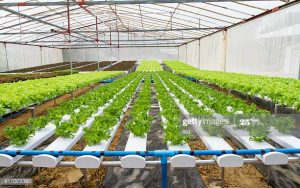Looking for a guide on how to start tomato greenhouse farming in Nigeria with a business plan to boot alongside?

Tomato greenhouse farming is a profitable and sustainable business in Nigeria that offers a year-round supply of fresh, high-quality tomatoes. It involves growing tomatoes in a controlled environment that is free from pests and diseases. In this article, we will provide a detailed guide on how to start tomato greenhouse farming in Nigeria.
Step 1: Conduct Market Research Before starting a tomato greenhouse farming business, it is essential to conduct market research to determine the demand for tomatoes in your area. Identify your target market and find out what type of tomatoes they prefer and how much they are willing to pay. This will help you determine the size of the market and potential competition.
Step 2: Choose a Suitable Location Choose a location that has access to a reliable source of water, electricity, and transportation. The greenhouse should be located in an area that receives plenty of sunlight and has good soil drainage.
Step 3: Obtain Funding Starting a tomato greenhouse farming business requires significant funding for greenhouse construction, equipment, and operational expenses. You can obtain funding from banks, investors, or government grants.
Step 4: Design and Construct Greenhouse Design and construct a greenhouse that is suitable for growing tomatoes. The greenhouse should be equipped with proper ventilation, heating, and cooling systems to maintain optimal growing conditions for the tomatoes. You can hire a professional greenhouse builder or construct the greenhouse yourself.
Step 5: Purchase Equipment and Supplies Purchase the necessary equipment and supplies for the greenhouse operation, such as irrigation systems, fertilizers, pesticides, and planting materials. You will also need to purchase specialized equipment such as tomato trellis clips, pruning shears, and harvesting containers.
Step 6: Choose Tomato Varieties and Planting Method Choose tomato varieties that are suitable for greenhouse farming and that are in high demand in your target market. You can choose to grow tomatoes from seeds or seedlings. Determine the spacing and planting density required for optimal yield.
Step 7: Implement Best Farming Practices Implement best farming practices such as proper irrigation, fertilization, pruning, pest, and disease control. Ensure that the greenhouse environment is kept clean and free from weeds and debris. Proper record-keeping and monitoring of the crop is essential for the success of the farm.
Step 8: Harvest and Market the Tomatoes Harvest the tomatoes when they are ripe and ready for sale. Proper harvesting and handling of the tomatoes are essential to prevent damage and spoilage. Market the tomatoes to your target market through direct sales or through middlemen such as wholesalers, retailers, or supermarkets.
In conclusion, starting a tomato greenhouse farming business in Nigeria can be a profitable and sustainable venture. However, it requires careful planning, hard work, and dedication to succeed. With proper market research, funding, greenhouse construction, equipment, and best farming practices, you can grow high-quality tomatoes that meet the demand of your target market and generate a steady income.
Greenhouse Farming Cost in Nigeria
The cost of setting up a greenhouse farm in Nigeria can vary depending on the size of the greenhouse, the type of crops to be grown, and the quality of materials and equipment used. Here is a breakdown of the estimated cost of starting a greenhouse farm in Nigeria:
- Greenhouse Structure: The cost of a greenhouse structure can range from N200,000 to N2,000,000 depending on the size, type, and quality of materials used.
- Irrigation System: An efficient irrigation system is essential for greenhouse farming. The cost of a drip irrigation system can range from N100,000 to N500,000 depending on the size of the greenhouse.
- Lighting and Ventilation: Proper lighting and ventilation are necessary for plant growth. The cost of installing artificial lighting and ventilation systems can range from N200,000 to N500,000.
- Seeds and Seedlings: The cost of seeds and seedlings can vary depending on the type of crops to be grown. The cost can range from N20,000 to N100,000.
- Fertilizers and Pesticides: Greenhouse crops require regular fertilization and pest control. The cost of fertilizers and pesticides can range from N20,000 to N50,000 per crop cycle.
- Labor Costs: The cost of labor depends on the number of employees and their salaries. The cost can range from N100,000 to N500,000 per month depending on the size of the greenhouse and the number of crops grown.
- Miscellaneous Costs: Miscellaneous costs such as transportation, administrative expenses, and insurance can add up to about N100,000 to N200,000 per year.
Overall, the cost of starting a greenhouse farm in Nigeria can range from N500,000 to N5,000,000 depending on the size and type of crops grown. It is essential to conduct proper market research, seek professional advice, and develop a solid business plan to ensure the success of your greenhouse farming venture.
Now that you know how to start tomato greenhouse farming in Nigeria, you should get a business plan to kickstart operations.
How To Download The Full Hydroponic Business Plan Template PDF (with financial analysis)
Above is a part of the Greenhouse business plan template in Nigerian. In case you need the complete greenhouse business plan, follow the procedures to download it.
Pay the sum of N8000 (Eight thousand naira only) to the account detail below:
Bank: GTBank
Name: Oyewole Abidemi (I am putting my name and not our company account so you know we are real people and you can trust us)
Ac/No: 0238933625
Type: Saving
Thereafter, send us your email address through text message to +234 701 754 2853. The text must contain the title of the hydroponic business plan you want and also your email address. Immediately after the confirmation of your payment, we will send the hotel business plan in Nigeria to your email address where you can easily download it.
